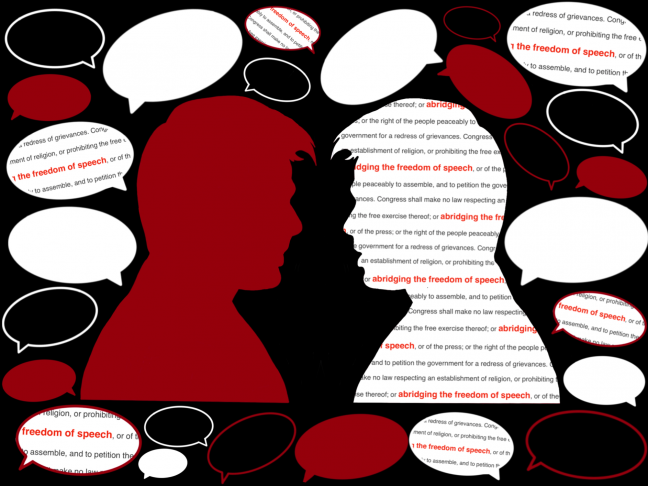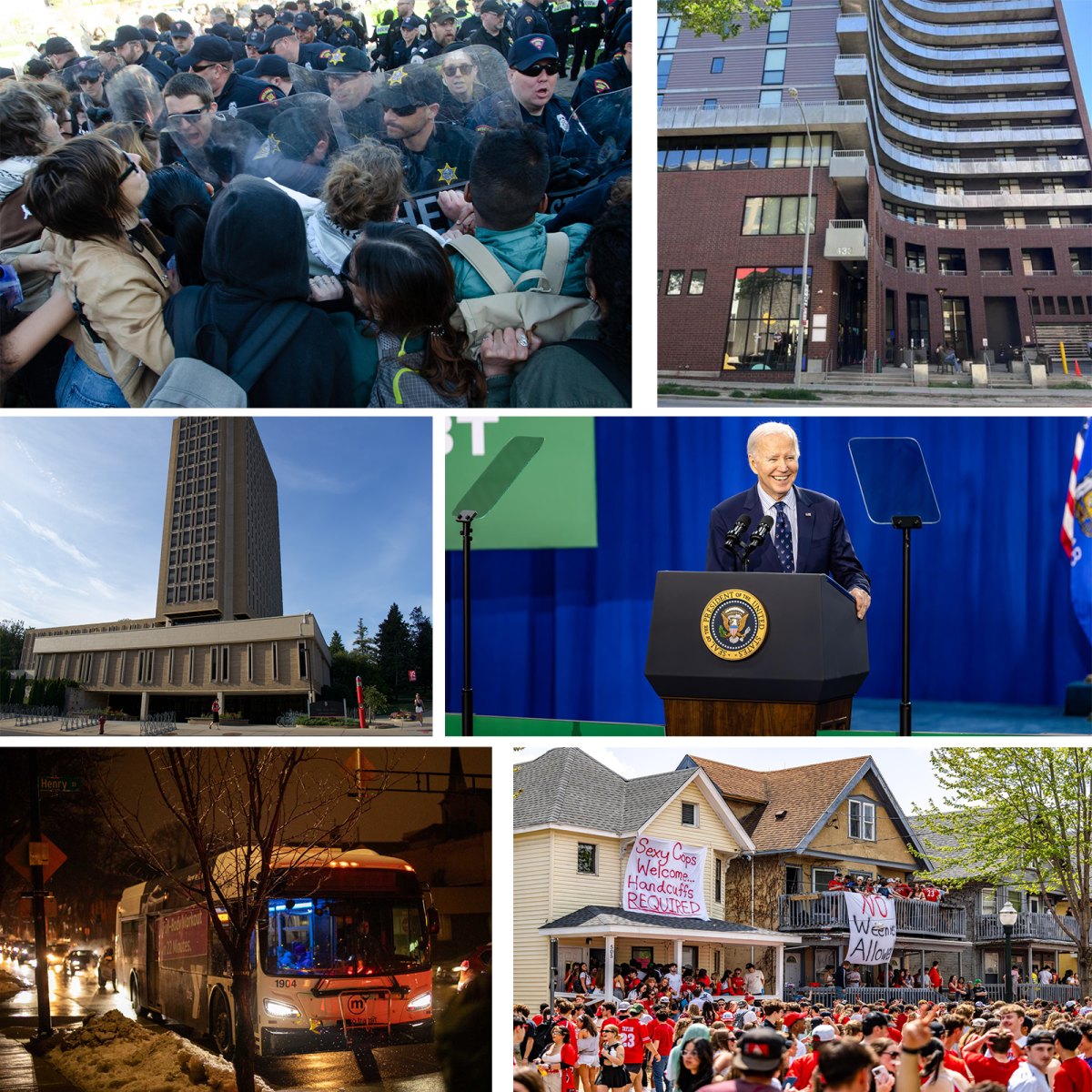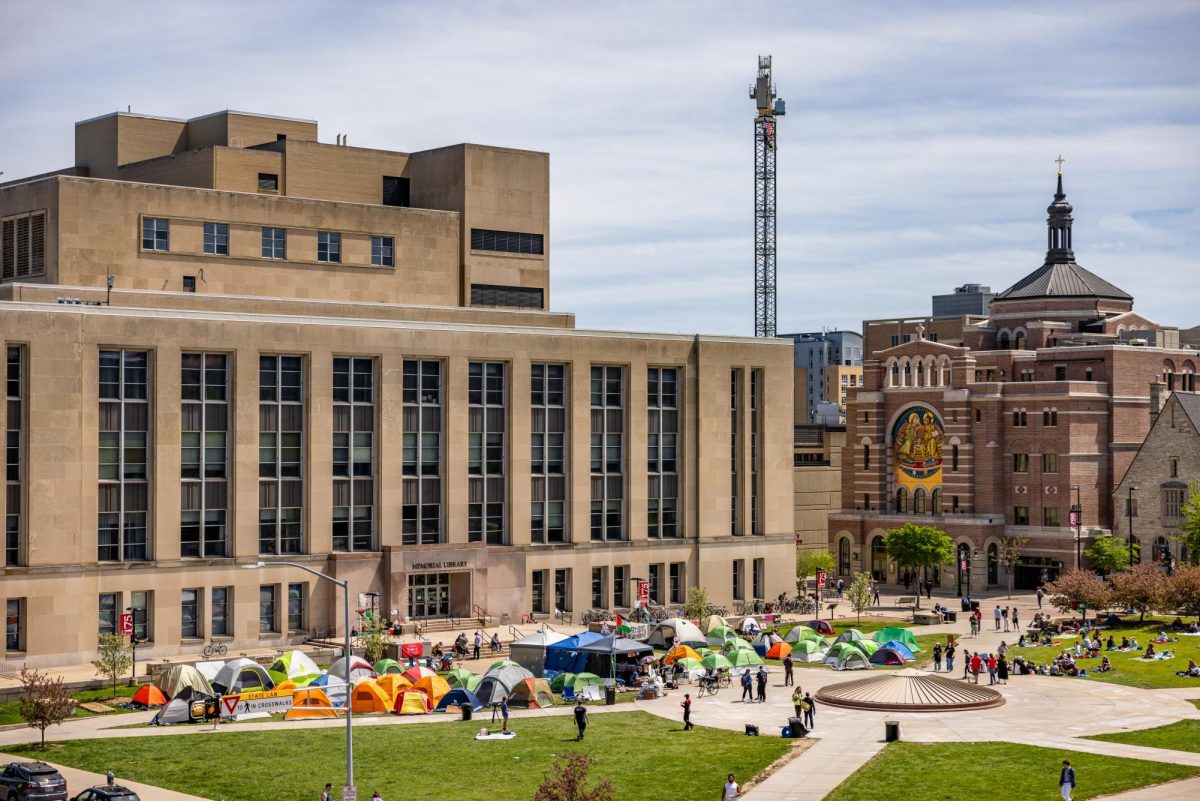Sunlight streamed through the third floor windows of the Student Activity Center. Like any Wednesday, students were spread about the tables, couches and cubicles, doing homework or catching up with friends. The College Republicans office stood proudly in the middle of it all, bedecked in President Donald Trump 2020 and Wisconsin Supreme Court Justice Daniel Kelly campaign signs. Amidst the humming of socializing students and clacking keyboards, a recognizable hip hop beat emerged.
“Yeah, yeah f— Donald Trump! Yeah, yeah f— Donald Trump!” rappers YG and Nipsey Hussle exclaimed from a cell phone speaker, as University of Wisconsin senior Jasmine Kiah rose from her table, papers in hand. While the song played, Kiah taped up signs over the windows of the College Republicans office. A smattering stated “Donald Trump is…” while the others finish the sentence — “racist,” “transphobic,” “sexist,” “ignorant,” to name a few.
Kiah called her demonstration an act of freedom of speech. She said it was not meant to send a message to the University of Wisconsin, but to make herself feel better. That being said, she also noted that during her time at UW, she’s seen all of the prejudices her signs accused President Trump of.
“I’ve been here for four years and all four years I’ve experienced racism. I’ve seen homophobia, transphobia, I’ve seen people not treated fairly, class institutional racism — all of that stuff. Everything that you could imagine, I’ve seen,” Kiah said to The Badger Herald in a previous statement. Kiah declined to be interviewed for this story.

By the Numbers
Kiah’s experiences are corroborated by statistics. According to the 2016 Campus Climate Survey, nearly one-third of UW students mentioned at least one incident on the survey where they personally experienced or witnessed an act of hostile, harassing or intimidating behavior.
Students of color, LGBTQ+ students, non-binary students and students with a disability were more likely to have been the target of the hostile, harassing or intimidating behavior they mention on the survey. Thirty-nine percent of students reporting incidents attributed their gender as the reason for this behavior. Thirty percent attributed the reason to their race.
As a consequence of the survey results, UW is working on a series of goals and recommendations to promote a more inclusive environment for students of all backgrounds and identities. Some of these goals include ensuring an inclusive learning environment, promoting UW’s shared values of diversity and inclusion and promoting dialogue across differences to emphasize mutual respect and understanding, according to the 2016 Campus Climate Survey Task Force Report.
But many feel certain speech — concerning politics or otherwise — is the antithesis of inclusivity, and creates negative psychological effects that are not conducive to an inclusive learning environment.
“Every day I come past and I see this office, it makes me very upset, while we have … children at the border who are taken away from their parents, their parents are taken away from them and who is it because? It is because of Donald Trump,” Kiah said.
The polarization of politics and the politicization of identity puts universities, especially public institutions, in a precarious predicament — not only to protect students’ free speech, but to protect free speech that some believe do not help facilitate an inclusive campus.
The 2019 College Pulse Study, commissioned by the Knight Foundation, shows how college students struggle with protecting speech considered offensive and creating an inclusive campus. Though a majority of students do not favor restrictions on free speech, 41 percent of students draw the line at hate speech, which currently receives constitutional protection under the First Amendment.
At the same time, 53 percent of students believe protecting free speech rights is more important than fostering inclusivity. Forty-six percent of students believe inclusivity is more important to a college campus than unrestricted speech. Of that 46 percent, students from historically underrepresented communities were more wary of unrestricted speech than white students, male students, Christian students, heterosexual students and cisgender students.
On the Margins
From a national standpoint, 83 percent of Republican students believe the political and social climate of their campus prevents them from expressing their honest opinion, according to the College Pulse Study. UW, however, diverges from this trend. According to the latest campus climate data, conservative students reported feeling more welcome and more respected when compared to other students.
Evan Karabas, UW junior and the Communications Director of the College Republicans of UW-Madison, noted that although conservative political opinions are not as prevalent on UW’s campus, the College Republicans view this as a challenge, not a setback.
“We definitely are fighting an uphill battle and our views are underrepresented. We’re definitely a minority here,” Karabas said. “If we don’t reach out to students and share our perspective with them, they may never hear it going through school … Instead of feeling sorry for ourselves, we have to embrace the challenge.”
The College Republicans took video of Kiah’s demonstration, which gained considerable traction on social media. The student group received an outpouring of support from other College Republicans chapters and enough publicity on UW’s campus to boost the group’s membership by a few heads, Karabas said. He also reported quite a few civil, productive discussions with students with opposing political views after the incident as well.
As a self-described free speech absolutist, Karabas reiterated the incredible importance of free speech on college campuses as means of education and preparation for the world after college. There will always be ideas one can disagree with, Karabas said, but if students are not allowed to be exposed to such ideas, they won’t have a full preparation for post-university life.
But for other students, dealing with offensive speech is a more frequent occurrence and it does not end cleanly, if at all. For Co-President of the UW chapter of National Association of Black Journalists and junior Enjoyiana Nururdin, dealing with offensive speech and having to educate her peers is something she’s dealt with her whole life — and will continue to do so after college.
“… [Offensive speech] also teaches us resilience too often, especially when we get out into the professional world, there are things that people are going to say that are going to be problematic,” Nururdin said. “We can’t pull up our activist campus move and yell at everybody. They’re just people. Sometimes we just have to sit back and wait. Do we email someone in HR? Or do we wait and talk to someone and ask, ‘How do I approach this kind of thing?’ You really do have to pick and choose your battles.”
And battles there have been — many this academic year in particular. In September 2019, two protesters stood on the corner of Park Street and University Avenue wearing nooses to raise awareness for climate change. The protesters said they were inspired by a similar protest in Europe, where protesters stood on blocks of ice with nooses around their necks.
In the American context, however, nooses evoke a horrific history of lynching, where thousands of Black men and women were brutally murdered, adding several layers meaning to the expression that protesters said they had not considered beforehand.
The protesters ended up leaving soon after the UW Police Department, the Division of Diversity, Equity and Educational Achievement and the Division of Student Life responded at the site of the protest. Afterwards, they participated in the university’s restorative justice program.
“We would like the people we hurt to know that while we can’t truly understand the emotions you are feeling, we realize and are ashamed of the harm we have caused,” the protesters’ statement said. “Again, we are sorry and want you to know we are learning from this.”
Learning Experiences
Though speech and expression like the climate protest can have adverse effects on inclusivity on campus, they provide opportunities for students to determine what speech or expression is acceptable on campus and what is not. UW political science professor Howard Schweber cites this as one of the many reasons why free speech is important, especially on college campuses.
“Part of the reason that we protect artistic speech, for example, or nonpolitical but opinionated speech is for people to try things out, try out ideas, try out opinions, explore people,” Schweber said. “There’s a value in exercising your own voice and there’s a value in changing that voice over time as you see fit and any kind of orthodoxy that limits expression gets in the way of that process.”
Jonathan Rauch, senior fellow in governance studies at the Brookings Institution, even went as far as to argue that negative speech drives knowledge and scientific inquiry.
“… You can’t make knowledge without dissent. If everyone agrees, then no one is asking the hard questions. And we become an echo chamber” Rauch said. “And we’ve actually seen that in some places on and off campus, in certain departments, certain subjects that would become very hard to have a critical conversation about. And you can’t do science that way. And without science you can’t do knowledge.”
Rauch said minorities are the key beneficiaries of free speech and that efforts to protect minorities from offensive speech do more damage, in most cases, than the speech itself. Minorities have been oppressed for centuries through infantilization, Rauch said, and to protect minorities from offensive speech would only infantilize them further.
Rauch did acknowledge this puts an undue burden on students of underrepresented backgrounds — the very same Nururdin touched on earlier — one he calls the “minority tax.” Rauch, who identifies as gay and Jewish and is known for his activism in favor of same-sex marriage, understands this burden. Rauch said, however, there are also several benefits.
“My claim is that that’s a burden, but it’s also a privilege because minorities, people in marginalized places, people who are, have minority viewpoints, see the injustices and problems of society more clearly than people in the majority,” Rauch said. “And we have the privilege of being the first people to challenge those injustices and to change those injustices and this education process. Yeah, it’s a pain in the ass … but it also is a fantastic opportunity to make positive change in society and one that we should embrace and value.”
Though Nururdin does not subscribe to this idea, she does enthusiastically take many opportunities to promote inclusive speech on campus.
“I can’t tolerate some things and be okay with my life. For the next white man that comes along, [using offensive speech] may be okay,” Nururdin said. “But for the next Black woman that comes along, it won’t be.”
Inconclusive
Freedom of speech and an inclusive campus are not always in direct opposition to each other, though they do interact quite frequently. Schweber said universities are multi-faceted spaces. This makes drawing a balance between free speech and inclusivity even more difficult.
“What makes the university so complicated in this context is that there’s several things at once. Basically small towns,” Schweber said. “So if you’re thinking of it as a town, it’s got lots of different kinds of spaces. It’s got public spaces and private spaces. It’s got classrooms and offices, it’s got Bascom Mall. And each of those presents different kinds of issues with free speech and academic freedom.”
On the other hand, Rauch argues finding a balance between free speech and inclusivity is a false dilemma, as minority populations are the key beneficiaries of unregulated speech.
“Trying to protect minorities from unsafe speech doesn’t help us. It hurts us,” Rauch said. “It means we can’t see where our opponents are. It means we’re not in a position to publicly refute them and push back, which is how we persuade people.”
As the political culture becomes more polarized, and society advances to create new forms of expression and new places to share them in, there is no doubt UW will grapple with issues related to speech and inclusivity in the years to come.
“People are still arguing over the First Amendment and the world, technology and opinions are constantly changing,” Nururdin said. “So we just have to be patient and know that change is going to come eventually.”















